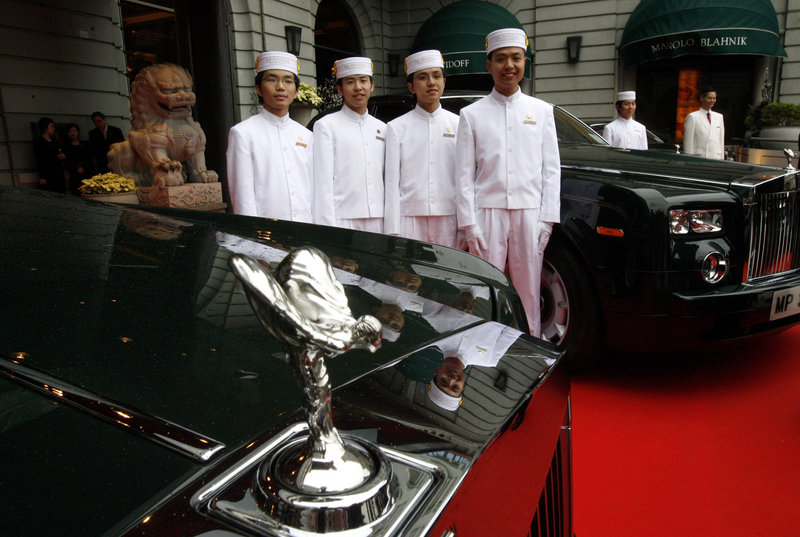BEIJING – Barely a decade ago, Beijing bicyclists pedaled down alleys here lined with courtyard houses that had no indoor toilets. Now, the alleys have been replaced by a wide avenue lined with Lamborghini, Ferrari, Bugatti and Rolls-Royce dealerships.
In 2011, Chinese bought more Lamborghinis and Rolls-Royces than anybody else in the world. In time for Chinese New Year this month, Rolls is unveiling a “Year of the Dragon” model with hand-embroidered versions of mythical animals on leather headrests. Prices start at $1.6 million.
China is on the verge of becoming the leading market for just about everything over-the-top expensive.
Companies obsessed with China a few years back for its flagrant counterfeiting now see it as their most promising customer, especially at a time when so many other nations are scrimping.
Gucci’s sales in China in the first half of 2011 were up 39 percent; Bottega Veneta’s more than 80 percent. Prada plans to open 50 shops over the next three years.
Chinese fashionistas are displacing those immaculate Japanese women in their Burberry scarves as the world’s leading consumers of luxury goods. The consulting firm McKinsey & Co. projected that China will bump Japan out of first place by 2015 as the leading market for pricey goods. Even with the softening of China’s real estate market, the source of much new money, some analysts believe the Chinese already top the luxury market.
In fact, sales figures understate Chinese spending because the rich here do much of their shopping abroad to avoid high taxes on luxury items and electronics.
So far, the Chinese haven’t approached the excesses of the so-called New Russians, who, after the Soviet collapse, quickly flaunted diamond-encrusted baubles and mega-yachts. After all, China is still at least nominally a communist country, and the culture is rich with proverbs about the terrible things that can befall show-offs (“A tall pine attracts more wind” and “Man should avoid fame like a pig avoids fattening,” to name two.)
Yet for some, conspicuous consumption, particularly in the social media era, does not seem to be a problem. Young women post photographs of themselves on microblogs with their Hermes handbags. The son of an auto tycoon uploaded on the Chinese equivalent of YouTube a video shot from behind the wheel of his $4.5 million Bugatti Veyron sports car weaving through traffic in the southern city of Chongqing.
“People are more extroverted. They have no problem showing off their wealth,” said Klaus Paur, an auto industry analyst and managing director in the Shanghai office of Synovate Motoresearch. When he came to China in 2003, he recalls, the wealthy drove large Mercedeses and Audis, invariably in black.
Chinese officialdom has something of a love-hate relationship with luxury goods, officials relishing their own creature comforts while deploring anybody else doing it too flagrantly. China still has 150 million people living on less than $1 a day. And it maintains some of the highest taxes in the world on luxury goods, adding up to 60 percent to the cost — which is why rich Chinese have become such prodigious shoppers abroad.
The Chinese equivalent of Rodeo Drive is a four-block strip in the heart of old Beijing along Jinbao Street, whose name appropriately means “gold treasure.”
The street was built in 2002 out of two traditional hutongs, or alleys, one named Jinyu, or “goldfish,” and the other Yaba, or “mute man,” part of a larger redevelopment project that displaced more than 4,000 families.
Expensive simply for the sake of expensive is all the rage. At a trade show on the resort island of Hainan in November, promoters unveiled a gold-plated toilet costing more than $200,000.
Chinese buyers of luxury goods are generally young adults, in keeping with the relative youthfulness of the country’s millionaires (about 15 years younger than those in the West), according to the Shanghai-based Hurun Research Institute, which maintains a so-called rich list.
“Our customers are super-rich, second-generation young people who have inherited money or whose parents buy them cars,” said Wilson Ho, whose company, Hong Kong-based Sparkle Rolls, runs Beijing’s Lamborghini dealership. “Chinese parents love their kids. They’ll buy them whatever they like.”
Send questions/comments to the editors.



Comments are no longer available on this story